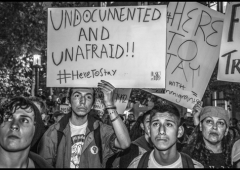Articles by: David Bacon
A relationship between a U.S. and a Mexican union, forged in the face of NAFTA, has borne fruit over decades of struggle. Two leaders reflect on the importance of international solidarity.
“Our vision is defending the interests of workers and a democratic union life.” In conversation with a longtime labor journalist, a Mexican union leader puts current worker struggles in context.
The Mexican Electrical Workers Union (SME) is Mexico’s most important independent union on the Left. Ten years ago, it was nearly destroyed. Today, its members are rebuilding through a new labor cooperative.
A 2002 discussion with Raúl Álvarez Garín, a survivor of the 1968 student massacre, on the ongoing legacy of state impunity in Mexico
Donald Trump's draconian immigration enforcement efforts face a basic challenge: the United States operates within an economic system that profits off immigrant labor.
Juárez maquiladora workers fight for their rights.
With 43 students still missing in Ayotazinapa, Raúl Álvarez Garín, who spent his life working to hold Mexican authorities accountable for violence, is as relevant today as ever.
Outside the Washington beltway, a loose network of groups is opposing most "comprehensive immigration reform" bills and their provisions, fighting back against increased enforcement and repression directed against immigrant communities.
Outside the windows above the telephones, the tree-lined street leads out to fields at the foot of cloud-topped hills. San Jose, at the edge of a valley an hour south of Oaxaca's capital city, is a pretty town. But this seemingly peaceful environment is deceptive. Since a mine began operating nearby, residents passing in the road view each other with suspicion.







